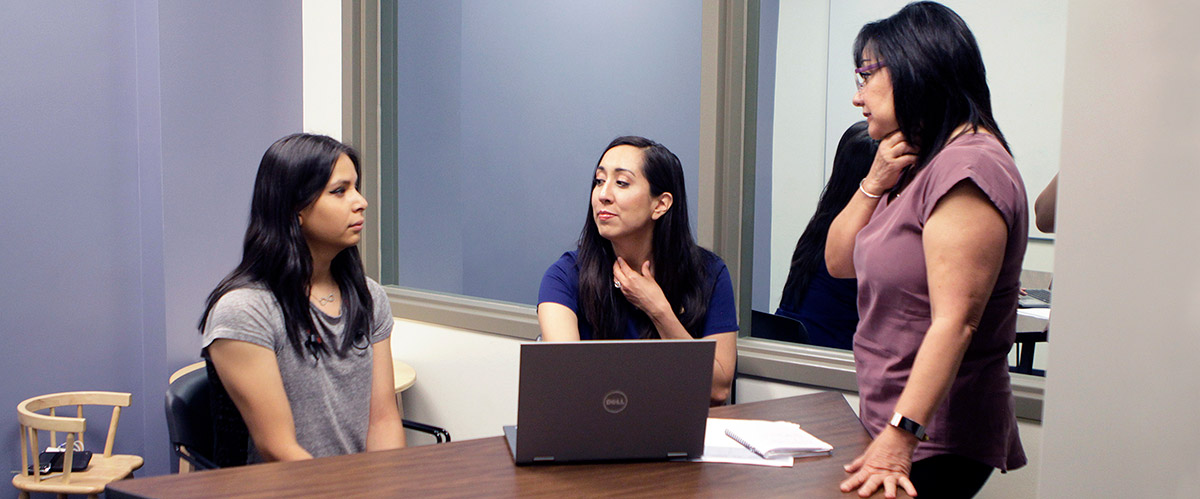UTEP Clinic Helps Transgender Individuals Empower Their Voice
Last Updated on May 25, 2018 at 12:00 AM
Originally published May 29, 2018
By Laura L. Acosta
UTEP Communications
In the Voice Modification Clinic for Transgender Individuals at The University of Texas at El Paso, speech language pathology student April Gutierrez is helping Andi Tiscareño find her feminine voice.

For two years, the clinic housed in UTEP’s Campbell Building has provided free vocal modification services to transgender clients such as Tiscareño, who choose to change their voice as part of their transition.
“Whenever I’d go through drive-thrus or I’d be on the phone, I’d be called ‘sir’ rather than ‘ma’am’ and it would always depress me,” said Tiscareño, a UTEP mechanical engineering student who has been living as a woman since 2016. She said the therapy has helped. “I’m hardly ever misgendered anymore.”
Tiscareño is one of 18 clients served at the clinic since it opened. It is the only clinic in El Paso that offers voice modification services to transgender men and women.
“We knew there was a need for this type of service in the community,” said Patricia Lara, Ph.D., speech language pathology assistant professor in the College of Health Sciences. “Insurance does not cover voice therapy for individuals who are transgender, and it can be difficult for them to find voice treatments that are safe and effective. If they try to do it on their own, they can cause damage to their vocal folds.”
In the clinic, 16 graduate students from UTEP’s speech language pathology (SLP) program work with Lara, director of UTEP’s Voice Brain and Language Lab, and Clinical Supervisor Deena Peterson to develop treatment plans and provide one-on-one voice modification. Both are certified speech language pathologists. The goal is to help clients raise or lower the pitch of their voice to match their gender identity.
For individuals like Tiscareño who transition from male to female, developing a higher pitch is necessary to sound feminine. Taking testosterone can help transgender men lower their voice by thickening their vocal cords, but for transgender women, taking the hormone estrogen does not thin out their vocal chords. They require exercises to raise their pitch.
During the spring semester, Tiscareño met with April Gutierrez twice a week to work on different techniques to help feminize her voice. They did vocal exercises to adjust Tiscareño’s pitch, and her intonation and resonance.
“(Tiscareño) has a musical background, so she was really good at matching pitch with the keys on a keyboard,” Gutierrez explained. “Now we’re practicing resonance by doing exercises that bring the voice forward. When females speak everything is forward in our mouths. Our tongue is forward. Our articulators. Our lips are spread apart. There’s a lot that goes into it.”
During their sessions, Tiscareño speaks into a computer’s microphone to measure her pitch. Lara said the pitch range is from 85-180 hertz for males and from 165-255 hertz for females. One of the tools the clinic uses is a free software program called, “Praat,” that analyzes speech. Tiscareño‘s voice appears as a wave on the screen indicating that she has reached a pitch of 173 hertz.
“(Tiscareño) is hitting a very feminine range,” said Peterson, who observed the session. “She’s definitely at her ideal pitch. She’s just adding some qualities to her voice.”
By helping transgender people find their true voice, the clinic also enhances their quality of life.
Since starting voice modification sessions 18 months ago, Tiscareño said her voice is higher, which has made her more comfortable presenting as a woman in public.
“It lifts that weight off my shoulders that I don’t have to try so hard to be perceived as a woman,” she said.
For Gutierrez, the opportunity to work with the transgender population has enriched her education.
“This is something that I’m passionate about, and I’m really looking forward to learning more from Dr. Lara before I graduate next year,” Gutierrez said. “I did not think that I would have the opportunity to work with the transgender population, but that’s what is so amazing about our speech profession is that you can do so much and help so many people.”
In addition to receiving valuable hands-on training, SLP students also received Safe Zone training. The goal of the training is to create more inclusive environments and spaces for the LGBTQ (lesbian, gay, bisexual, transgender, or queer/questioning) community, Lara said. Students learn how to be effective health care providers to the LGBTQ population.
She is working on a study that examines voice therapy outcomes in transgender individuals following voice therapy.
Lara said patients are discharged when they’ve met their personal goals. In addition to attending regular voice modification sessions, she also advises patients to stay away from cigarettes and caffeine and to drink lots of water to ensure their vocal cords stay properly hydrated.
The clinic also works with clients on non-verbal communication.
“Females and males have different communication styles,” Lara explained. “Females tend to use their hands a lot when they communicate. We tend to have better eye contact than males. We also tend to get closer to our listeners.”
For more information about the Voice Modification Clinic’s services, contact Patricia Lara at plara2@utep.edu.